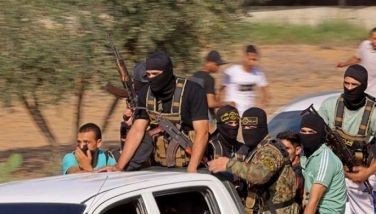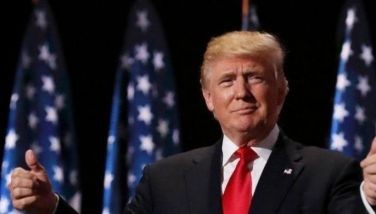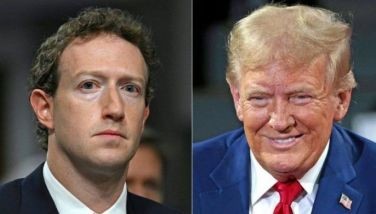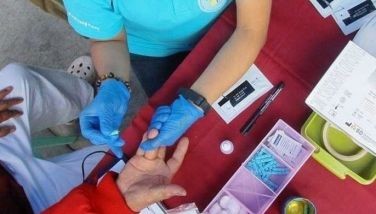Analysis: H-bomb or A-bomb, N. Korean nuke test is about Kim
SEOUL — It's a single image released by an enormous propaganda apparatus, showing a note handwritten by a dictator. And it contains a telling clue to the mindset behind North Korea's surprise and disputed claim to have tested its first hydrogen bomb.
The Dec. 15 note from Kim Jong Un calls for a New Year marked by the "stunning sound of the explosion of our country's first hydrogen bomb." The document closes with his signature — almost like a rock star signing an autograph.
The photo, released after the North's nuclear test Wednesday, points to this conclusion: While the world focuses on how the explosion will resonate beyond the nation's borders, the whole thing is really all about Kim, North Korea's third-generation leader.
Four years after his abrupt ascent following his father's sudden death, analysts are split on whether Kim is coming into his own as a leader, confidently balancing competing interests among powerful military and political camps, or whether he's struggling to put his mark on a Shakespearean churn of political jockeying and bloodshed that roils beneath the smooth propaganda surface.
Whether Kim is confident or desperate, the note provides a look at the careful calibration behind the nuclear test's propaganda. The date on the note, from three weeks ago, and the missive's almost poetic tone are meant to show both deliberation and pride from a leader who approved and orchestrated the test.
The note speaks of making "the entire world look up to" North Korea and the ruling party, while giving no regard to the international outrage the nuclear test was certain to generate, including from China, the North's most important ally. The test was aimed not at external forces, but at showing Kim's citizens that he is in full command at an important moment.
John Delury, an expert on Korea and China at Seoul's Yonsei University, describes the note's message like this: "Let no one be confused; there's no factional struggle; the military isn't telling him what to do."
Whether that's a true representation of what's happening in one of the world's most secretive governments is another matter, especially regarding the powerful military.
With little diplomatic progress and nearly three years since the last nuclear test, Kim might have calculated that it was time to agree to his military's push for another. Or, as some analysts speculate, maybe the order was given as soon as scientists were ready to detonate.
Kim may be associating himself closely with what his state media call the "H-bomb of justice" in part because a hydrogen bomb would be a clear advance on the nuclear tests conducted under his father's rule. And to the people of his isolated country, international doubts about whether the device was truly an H-bomb probably won't matter.
"Our hydrogen bomb test is like the big thunder of a great country, and it really makes me feel great and happy," said Ri Chon Hyang, a Pyongyang resident. "Not just me, my friends are also so happy, we don't know how to put it into words."
North Korean state media routinely cast nuclear weapons as the only way to stand up to the country's archenemy Washington. The military needs nuclear tests to advance its quest for a warhead small enough to fit on a long-range missile.
Propaganda has always been crucial for the Kim family's control of the North, but it's especially important for Kim Jong Un. Thought to be in his early 30s — and celebrating a birthday Friday — he has been dealt much different cards than his father, Kim Jong Il.
Kim Jong Un took power in late 2011, while still in his 20s. Although he had a few years as the anointed heir, his experience was paltry when compared with his father. Kim Jong Il was given increasingly important responsibilities by his own father, North Korea founder Kim Il Sung, over a long apprenticeship and was middle-aged when he took power in 1994.
From the beginning, Kim Jong Un moved quickly when he perceived challenges from his lieutenants.
He had his uncle, and the country's No. 2 power, Jang Song Thaek, publicly shamed and then executed for treason in December 2013. The year before, he purged another supposed mentor, North Korean army chief Ri Yong Ho, whose fate is still unknown.
A think tank affiliated with South Korea's spy agency said last year that Kim has executed more than 100 senior officials. Last year, he ordered a defense chief executed with an anti-aircraft gun for complaining about the young ruler, talking back to him and sleeping during a meeting, the spy agency told lawmakers in a briefing.
The recent car crash death of Kim Yang Gon, the top official in charge of ties with Seoul, was viewed with suspicion in the South because crashes have previously been seen as ways to get rid of unwanted officials.
Kim's note represents a different way of cementing his position over North Koreans. He's making himself a part of history, however it's seen outside his country's borders. In a land awash with portraits and statues of his father and grandfather, the note is part of Kim's effort to claim a place beside them.
- Latest
- Trending



























